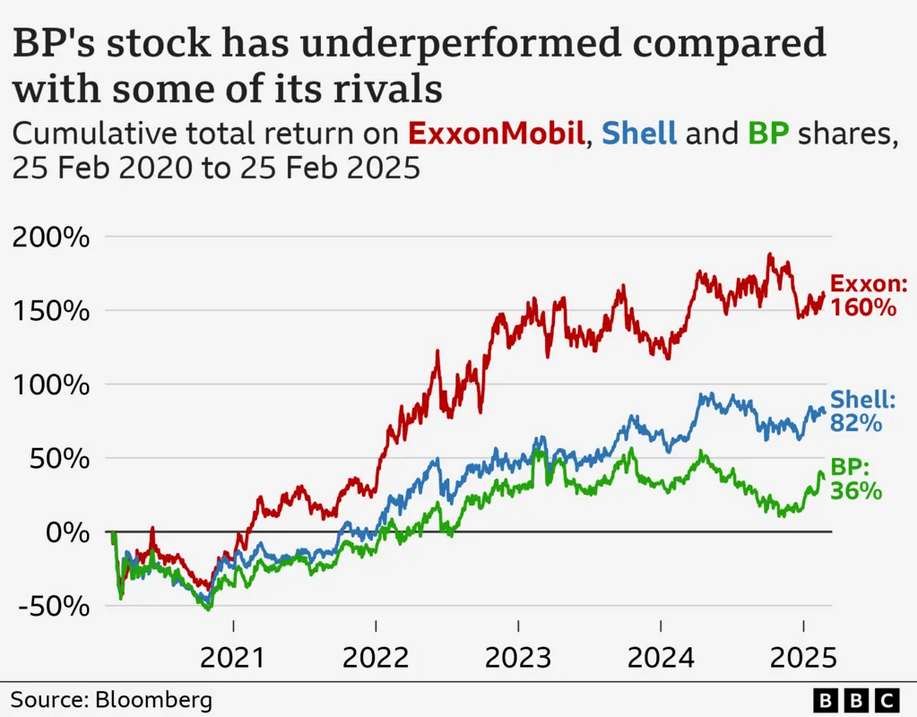British Petroleum plans to slash its renewable energy investments, and targets increasing oil and gas production.
British Petroleum plans to slash its renewable energy investments, and targets increasing oil and gas production.

British Petroleum (BP) is expected to announce it will slash its renewable energy investments and instead focus on increasing oil and gas production.
The energy giant will outline its strategy later following pressure from some investors unhappy it’s profits and share price have been much lower than its rivals.
Shell and Norwegian company Equinor have already scaled back their plans to invest in green energy. Meanwhile, US President Donald Trump’s “drill baby drill” comments have encouraged investment in fossil fuels and a move away from low-carbon projects.
Some shareholders and environmental groups have voiced concerns over any potential ramping up of the production of fossil fuels.

Five years ago, BP set some of the most ambitious targets among large oil companies to cut production of oil and gas by 40% by 2030, while significantly ramping up investment in renewables.
In 2023, the company lowered this oil and gas reduction target to 25%.
It is now expected to abandon it altogether while confirming it is cutting investments in renewable energy by more than half in what chief executive Murray Auchincloss called a “fundamental reset”.
Mr Auchincloss is under pressure to boost profits from some shareholders including the influential activist group Elliot Management, which took a nearly £4bn stake in the £70bn company to push for more investment in oil and gas.
In 2024, BP’s net income fell to $8.9bn (£7.2bn), down from $13.8bn the previous year.
Since 2020 when former chief executive Bernard Looney first unveiled his strategy, shareholders have received total returns including dividends of 36% over the last five years. In contrast, shareholders in rivals Shell and Exxon have seen returns of 82% and 160% respectively.
BP’s underperformance has prompted speculation that it may be a takeover target or may consider moving its main stock market listing to the US where oil and gas companies command higher valuations.
Not all shareholders want the company to change course so radically.
Last week, a group of 48 investors called on the company to allow them a vote on any potential plans to move away from its previous commitments to renewables.
A spokesperson for one of the signatories, Royal London Asset Management, said: “As long-term shareholders, we recognise BP’s past efforts toward energy transition but remain concerned about the company’s continued investment in fossil fuel expansion.”
The environmental group Greenpeace UK has warned BP could expect “pushback and challenge at every turn if it doubles down on fossil fuels – not just from green campaigners but from its shareholders”.
Senior climate adviser Charlie Kronick said: “Government policies will also need to prioritise renewable power, and as extreme weather puts pressure on insurance models – policymakers will be looking to fossil fuel profits as a way to fund extreme weather recovery. BP might want to seriously put the brakes on this U-turn.”
‘Science hasn’t changed’
“I do wonder whether this sort of decision will look right in 10 years,” added Sir Ian Cheshire, who has held many executive roles at companies such as B&Q owner Kingfisher and Barclays Bank.
He told the BBC’s Today program that the “overall energy transition” to renewables was “still going to come”.
“The climate change issue has not gone away, the science hasn’t changed,” he said.
AJ Bell analyst Russ Mould said this was one of the most significant moments for BP in the last four or five years.
“Other energy companies have been clearer about their intentions thus far than BP,” he said.
“They need to prove to people that after a difficult operational and share price performance compared to their peers, that they’re looking to do something about it, not just let things drift along, he added.
BP has already placed its offshore wind business in a joint venture with Japanese company Jera and is looking to find a partner to do the same with its solar business.
The refocus on oil and gas could also see sales of other businesses to get “non-core stuff off the books” as insiders describe it.
It is over 20 years since former chief executive Lord John Browne said BP could stand for “Beyond Petroleum” as he launched the company’s first tentative moves away from oil and gas.
Today’s strategy shift could be dubbed “Back to Petroleum” – to the delight of some shareholders and the dismay of others.
Both BP and Elliott management declined to comment.
Source: BBC





